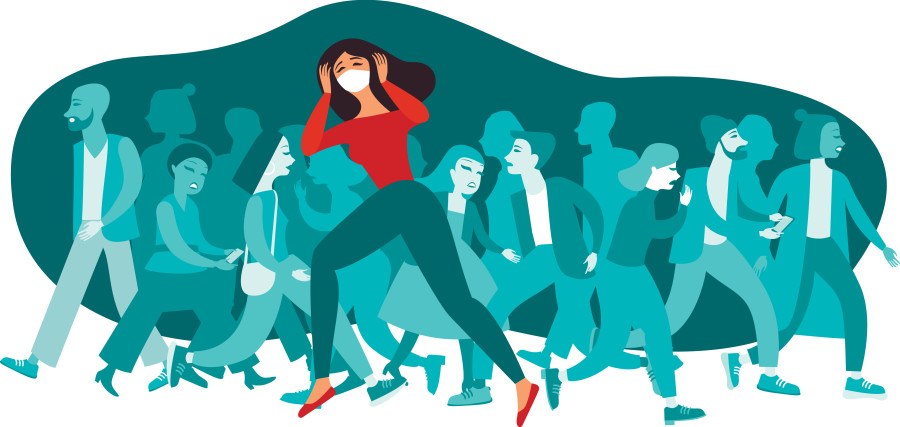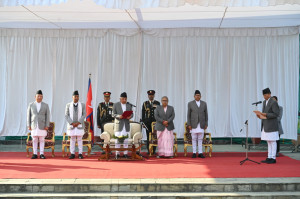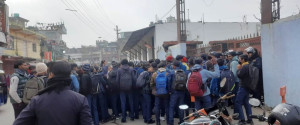National
Fear and loathing: Stigma and ostracisation for those who’ve returned from abroad
There are increasing reports of returnees, and actual Covid-19 patients, being ostracised and stigmatised by their communities.
Elisha Shrestha
Since returning to Nepal on March 19 from the United Kingdom, Haushala Thapa Zimba has been spending all her time behind closed doors, under voluntary self-quarantine, even though she does not have any symptoms of Covid-19. She is duly following instructions given by the government and medical officials to stay home for at least 14 days, the incubation period for the coronavirus.
“It is my responsibility to ensure that I am not a source of any spread. It has already been 11 days since I locked myself inside my bedroom to limit physical contact with others, while watching for symptoms,” said Zimba, who runs a school ‘Children and Youth First’ in Godawari for around 50 underpriviledged children.
But ever since she returned from the UK, a rumour has spread in the community that she has Covid-19. Zimba and even the children and staff members have been getting threats from people in the community that have left everyone in the school confused and scared for their lives.
“Last Saturday, when one of my students had gone to buy a snack at a nearby shop, a mob of 15 to 20 people gathered around him in the middle of the road and started verbally harassing him. Some called him ‘corona’ while others threatened to beat him up if they ever saw him again outside the school compound. That boy is just 15 years old,” said Zimba.
Zimba also said that a group of aggressive people later came to the school and threatened to thrash anyone who came out of the compound.
“It is heart-breaking to face the first-hand effects of stigma from those I regard as friends,” said Zimba.
Since the outbreak of the coronavirus began, there has been an increase in discrimination, prejudice and stigma towards people like Zimba who are now associated with the coronavirus, however remotely. Fear and a lack of proper information, and often deliberate misinformation, are contributing to the stigmatisation and ostracisation of people who returned from abroad, people who might show symptoms of the flu or the common cold, and even those who might have family who came back from abroad.
According to Jamuna Maharjan, a clinical psychologist at the Transcultural Psychosocial Organization, it is fear and anxiety that lead to social stigma.
“Since the coronavirus can be transmitted by people who show no symptoms, it has given birth to fear, which has further led to close-minded attitudes and rumours,” said Maharjan.
In the West, there have been reports of racism toward members of the Asian community, leading to a rise in verbal threats and physical attacks. Zimba too said that she became a target of xenophobia while in London, when a random person passed a racist comment saying “you guys are the ones who brought the virus.”
But in Nepal, it is people like Zimba who have returned from abroad who are being targeted and blamed for spreading the virus.
“According to news reports, the coronavirus has only been found in people who returned to Nepal from abroad, and as a result, people have become suspicious towards all returnees,” said Maharjan.
Senior Superintendent Raj Kumar Khadgi at the Nepal Cyber Crime Bureau said that there are around three or four online harassment cases related to coronavirus filed daily.
“We have been getting complaints from people who have just returned from abroad, saying that they are being called ‘corona patients’ online and are getting death threats from anonymous online users,” said Khadgi.
Khadgi, however, said that despite complaints, the operations team at the Bureau has been unable to take any actions due to the country being under lockdown.
“Although the situation is critical, and many people who have returned are getting abused online, we are not in a position to take any major action against the perpetrators,” said Khadgi.
Recently, when a 19-year-old Nepali student who returned to Nepal from France via Qatar on March 12 tested positive for Covid-19, people on social media accused her of spreading the virus and openly posted death threats. The threats were only exacerbated by a front-page report in an English-language daily newspaper that ran with a headline speculating whether the student had spread the virus to many others. But in fact, the woman had meticulously abided by self-quarantine measures.
According to Maharjan, patients and those who are being stigmatised come under additional stress due to vitriol, both online and offline, affecting their emotional and mental health.
“I wonder how people can be so insensitive towards a person who is already sick. They need to realise that when a person is sick, their mental state is already vulnerable, and in such a situation, instead of getting moral support, if they get hate from everyone, it will further put them at high risk,” said Maharjan.
Discrimination, prejudice and stigma also have a more insidious effect, leading people with possible symptoms to not seek medical help for fear of being ostracised. In India, 11 people suspected of having the coronavirus fled from a hospital owing to fears of stigmatisation.
Pooja, a 15-year-old from Kalimati, who has had a fever and cough for a week also said that initially she was reluctant to visit the doctor due to fears of being stigmatised.
“I only went to the Civil Hospital after my brother insisted,” she said. “The doctor gave me cough syrup for the sore throat and I am now recovering from a minor flu.”
According to doctors, the only way to prevent the spread of fear and misinformation is to provide transparent and accurate information about the pandemic on a daily basis via a reliable and trustworthy source. Essential preventive measures also need to be disseminated through the radio, television, newspaper and the internet. Much of the suspicion has also been buttressed by the government’s initially lacklustre response to the coronavirus and in the absence of clear communication, a belief that the authorities are hiding something.
“The closer we are to the truth, the farther we are from fear, which can put a stop to stigma related to the virus,” said Dr Deebya Raj Mishra, a pulmonologist at the BP Koirala Institutes of Health Science.
Zimba also believes that if people had been properly educated regarding quarantine and self-isolation and how Covid-19 actually spreads, she, along with her staffs and children, would not have been a target of hate and discrimination.
“Instead of being bitter and abusive, I hope that people will learn to be empathetic and compassionate in a crisis like this,” she said.




 5.3200000000001°C Kathmandu
5.3200000000001°C Kathmandu (1).jpg)







%20(1).jpg&w=300&height=200)






